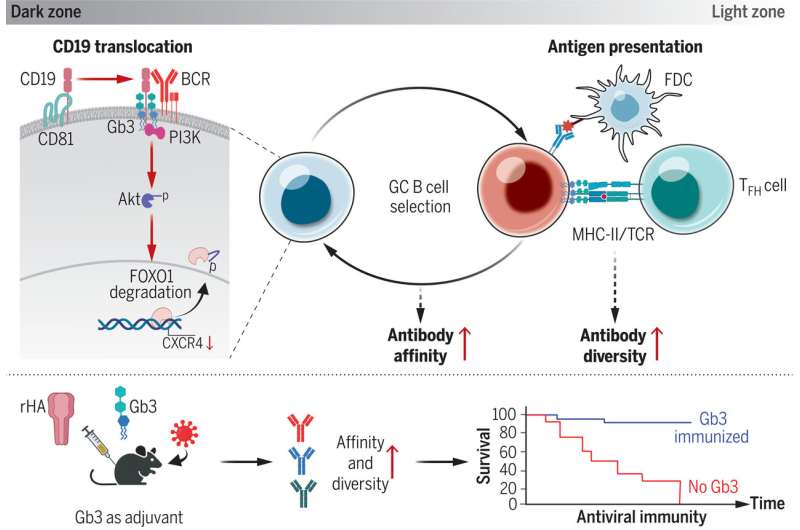This article has been reviewed according to Science X's editorial process and policies. Editors have highlighted the following attributes while ensuring the content's credibility:
fact-checked
peer-reviewed publication
trusted source
proofread
New insights on B cells: Researchers explore building better antibodies and curbing autoimmune diseases

Four new studies led by Harvard Medical School researchers at Boston Children's Hospital reveal details about how B cells in the immune system churn out antibodies that become increasingly potent and specific after we're vaccinated or exposed to an infection.
Two of the studies show how to enhance this process—known as affinity maturation—to lay a foundation for developing more broadly protective vaccines and antibody-based biologic treatments.
The other two studies uncover ways in which affinity maturation sometimes goes awry, creating antibodies that attack the body's own cells. The findings suggest new strategies for treating autoimmune diseases.
Honing antibodies for vaccines and biologics
Previous lab-based approaches to creating more potent antibodies have fallen short, leading to disruption of B-cell function or the creation of antibodies that are inefficient and unstable.
Researchers led by Yiming Yin, HMS research fellow in pediatrics in the lab of Michael Farzan, HMS professor of pediatrics at Boston Children's, set out to capture the natural power of affinity maturation.
As described in Nature Biomedical Engineering in March, they performed CRISPR gene editing on B cells in mice, replacing genes for antibody light and heavy chains with their human counterparts at appropriate locations along chromosomes.
"Our goal is to harness the underlying wisdom of our own immune system," Farzan said. "Humans have very specific immune features that animal models don't mimic."
The animals' B cells then underwent affinity maturation, producing potent human antibodies in a short amount of time.
As a proof of concept, Farzan, Yin, and colleagues introduced the genomes for HIV antibodies into mouse B cells. They then exposed the cells to a test HIV vaccine and allowed affinity maturation to happen.
This generated new and better antibodies against HIV—something they hope to try next in non-human primates.
In another test, they got mouse B cells to shift from making antibodies against early strains of SARS-CoV-2 to making antibodies able to neutralize omicron variants.
An adjuvant to charge up flu vaccines?
In separate work, Pankaj Sharma, HMS research fellow in pediatrics, and colleagues in the lab of Florian Winau, HMS associate professor of pediatrics in the Boston Children's Program in Cellular and Molecular Medicine, focused on germinal centers, the structures in our lymph nodes and spleen that facilitate B cell maturation.
They found that a lipid called Gb3 is needed for B cells to mature in the germinal center and make high-affinity antibodies.
Gb3 also increases the diversity of B cell responses, leading to the generation of broadly neutralizing antibodies, Winau said.
When the researchers added Gb3 to a flu vaccine, the vaccine protected against diverse strains of influenza, a virus that tends to mutate and elude vaccines. They propose that Gb3 be used as an adjuvant for vaccination, potentially for a variety of viral infections. They are also now testing Gb3 as an adjuvant for anti-cancer vaccines.
Findings were published in Science in February.
New insights on autoimmunity: How B cells go rogue
Two more studies explored how B cells sometimes go overboard, producing antibodies that attack a person's own tissues.
The first—led by Elliot Hideki Akama-Garren, an HMS MD student and Harvard Griffin Graduate School of Arts and Sciences Ph.D. student in the Program in Immunology studying in the PCMM lab of Michael Carroll, HMS professor of pediatrics (pathology)—focused on follicular T cells, which provide signals to help B cells with affinity maturation.
The team found that a specific set of follicular T cells can go rogue, leading to the formation of B cells that lose their tolerance to the body's tissues and produce autoreactive (self-attacking) antibodies.
The findings may have treatment implications for autoimmune conditions such as lupus and rheumatoid arthritis as well as the development of autoreactive antibodies in people with Epstein-Barr virus or COVID-19.
Findings were published in February in Science Immunology.
Making B cells autoreactive
A companion study from the Carroll lab—led by former postdoctoral fellow Theo van den Broek and Kristine Oleinika, HMS research fellow in pediatrics—further investigated how autoimmune disease is initiated.
The study began with the knowledge that B cells that have lost tolerance to the body's own tissues can take hold in areas of the body called germinal centers, where B cells get activated and tuned to specific targets.
In people with early or low-level autoimmune disease, naive B cells—those not yet exposed to a vaccine or pathogen—enter these germinal centers and then go rogue as well, producing a wide range of autoreactive antibodies.
Carroll and colleagues wanted to understand what allows this to happen.
By joining the blood circulations of wild-type mice and mice with lupus, they could observe the development of autoimmunity in real time. They identified several ingredients that enable healthy B cells to invade autoreactive germinal centers: Toll-like receptor 7, B cell receptor specificity, antigen presentation, and type 1 interferon signaling.
While more work is needed, Carroll believes the insights from these two studies could lead to new targets for treating autoimmunity.
"These latest observations will allow us to break down the kinetics of how new clones of autoreactive B cells become activated and how disease 'spreads' to new tissue targets, which is a major problem in diseases such as lupus," he said.
Findings were published in March in Science Immunology.
More information: Yiming Yin et al, In vivo affinity maturation of mouse B cells reprogrammed to express human antibodies, Nature Biomedical Engineering (2024). DOI: 10.1038/s41551-024-01179-6
Pankaj Sharma et al, The lipid globotriaosylceramide promotes germinal center B cell responses and antiviral immunity, Science (2024). DOI: 10.1126/science.adg0564
Elliot H. Akama-Garren et al, T cell help shapes B cell tolerance, Science Immunology (2024). DOI: 10.1126/sciimmunol.adj7029
Theo van den Broek et al, Invasion of spontaneous germinal centers by naive B cells is rapid and persistent, Science Immunology (2024). DOI: 10.1126/sciimmunol.adi8150




















